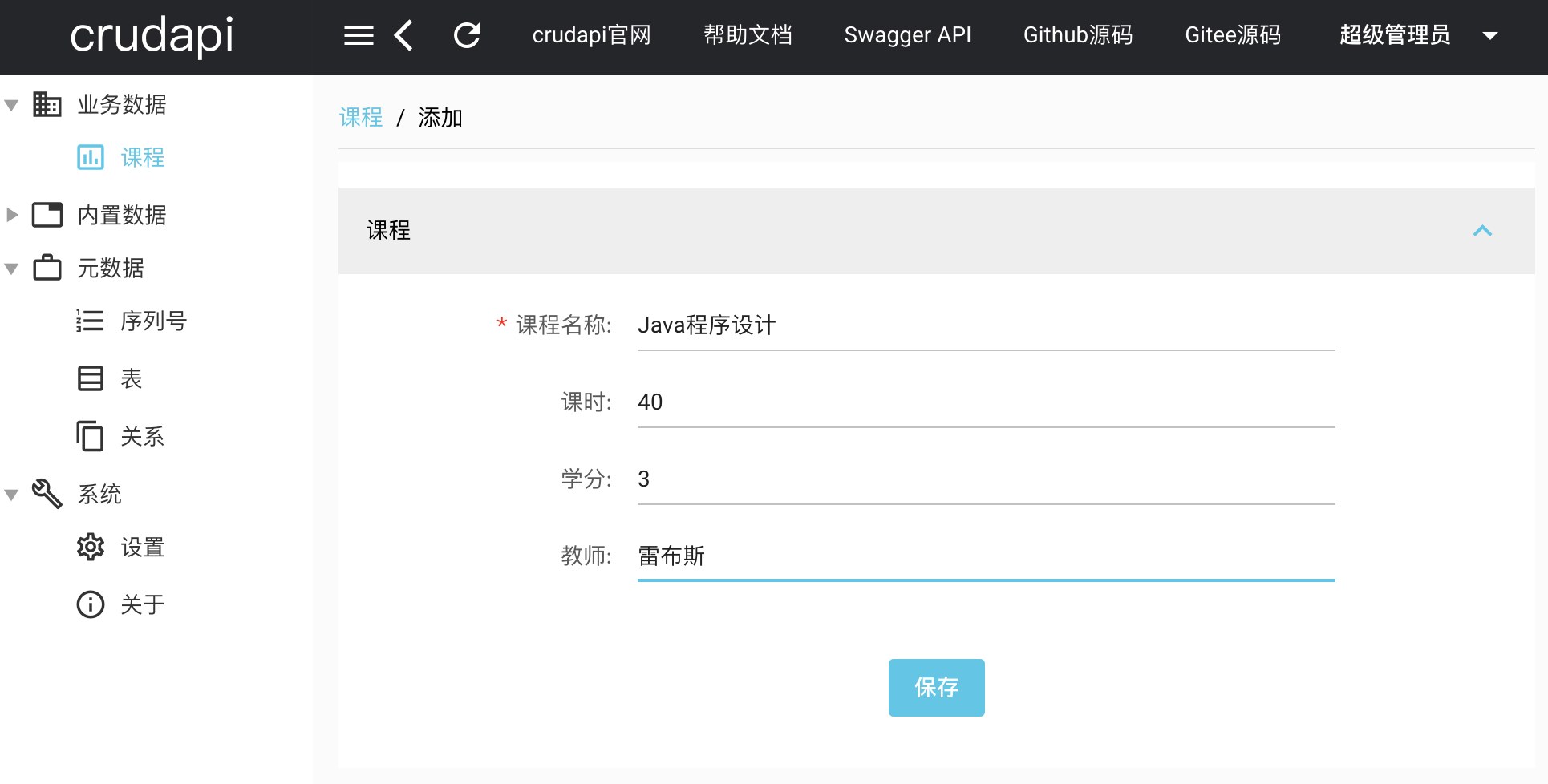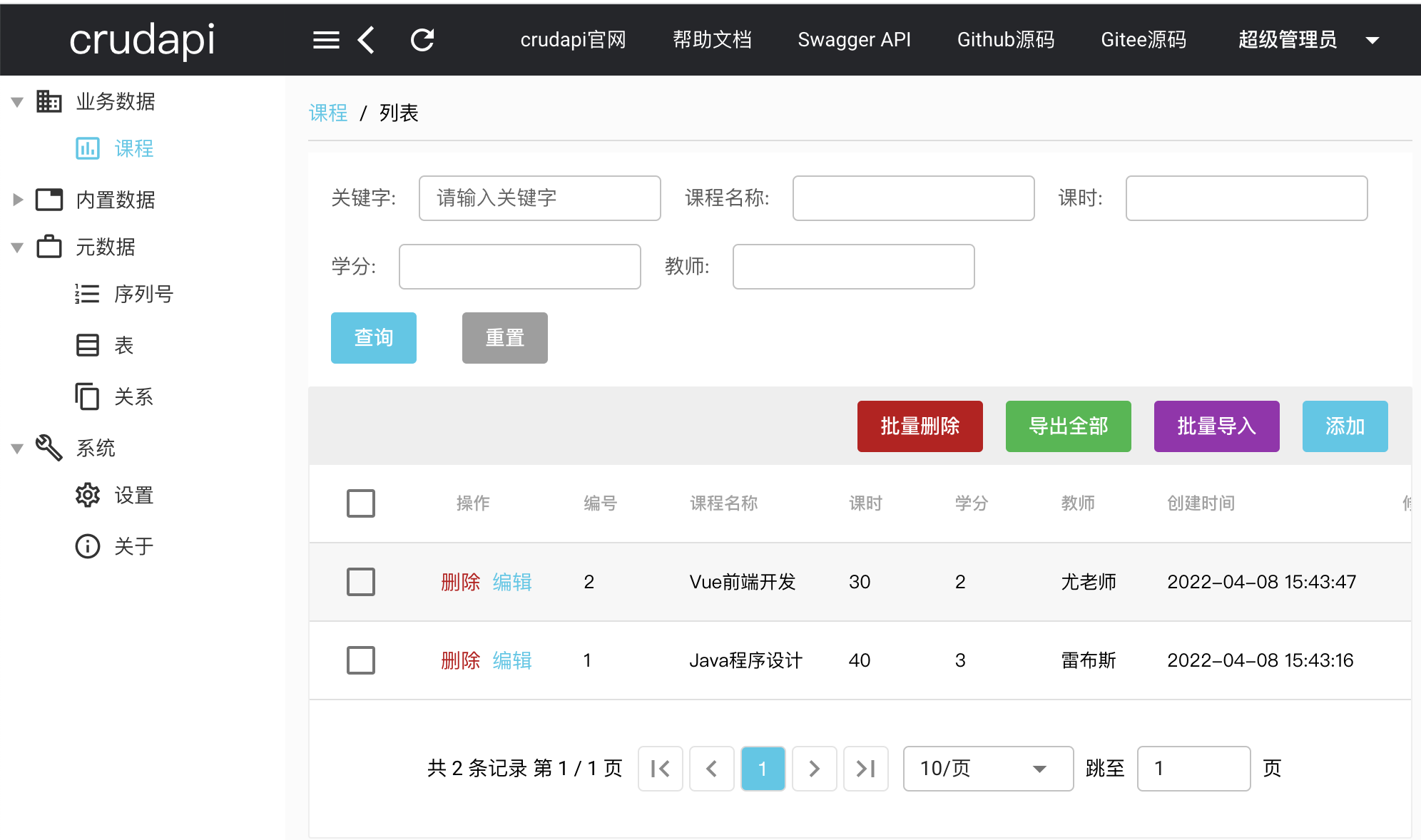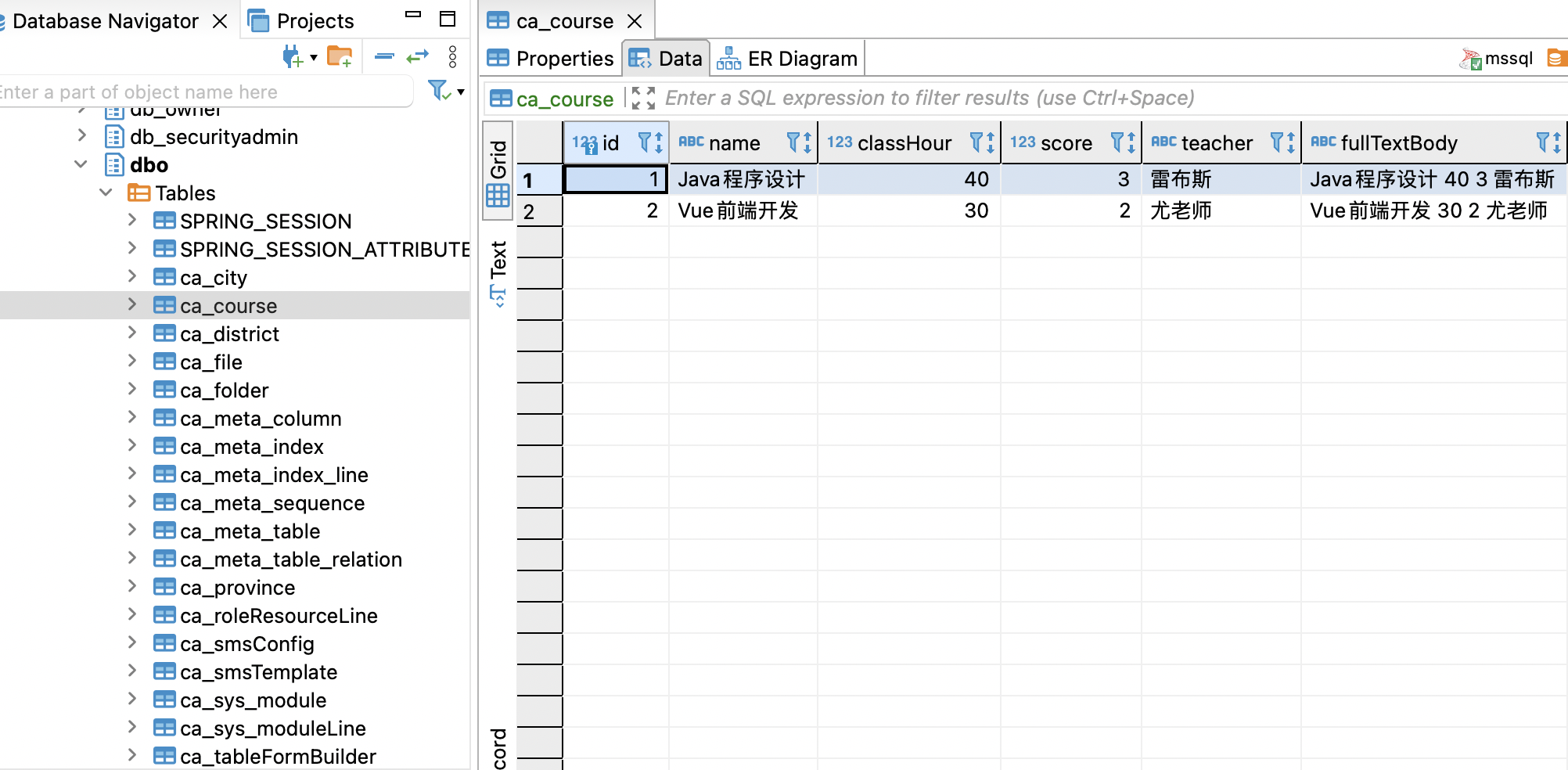# 微软mssql数据库
# 回顾
通过之前一篇文章 甲骨文oracle数据库 的介绍,引入了FreeMarker模版引擎,通过配置模版实现创建和修改物理表结构SQL语句,并且通过配置oracle数据库SQL模版,基于oracle数据库,零代码实现crud增删改查。本文采用同样的方式,很容易就可以支持微软SQL Server数据库。
# MSSQL简介
SQL Server 是Microsoft 公司推出的关系型数据库管理系统。具有使用方便可伸缩性好与相关软件集成程度高等优点,可从运行Microsoft Windows的电脑和大型多处理器的服务器等多种平台使用。Microsoft SQL Server 是一个全面的数据库平台,使用集成的商业智能 (BI)工具提供了企业级的数据管理。Microsoft SQL Server 数据库引擎为关系型数据和结构化数据提供了更安全可靠的存储功能,使您可以构建和管理用于业务的高可用和高性能的数据应用程序。
# UI界面
通过课程对象为例,无需编程,基于MSSQL数据库,通过配置零代码实现CRUD增删改查RESTful API接口和管理UI。
 创建课程表
创建课程表
 编辑课程数据
编辑课程数据
 课程数据列表
课程数据列表
 通过DBeaver数据库工具查询mssql数据
通过DBeaver数据库工具查询mssql数据
# 定义FreeMarker模版
# 创建表create-table.sql.ftl
CREATE TABLE "${tableName}" (
<#list columnEntityList as columnEntity>
<#if columnEntity.dataType == "BOOL">
"${columnEntity.name}" BIT<#if columnEntity.defaultValue??> DEFAULT <#if columnEntity.defaultValue == "true">1<#else>0</#if></#if><#if columnEntity.nullable != true> NOT NULL</#if><#if columnEntity_has_next>,</#if>
<#elseif columnEntity.dataType == "INT">
"${columnEntity.name}" INT<#if columnEntity.autoIncrement == true> IDENTITY(1, 1)</#if><#if columnEntity.defaultValue??> DEFAULT ${columnEntity.defaultValue}</#if><#if columnEntity.nullable != true> NOT NULL</#if><#if columnEntity_has_next>,</#if>
<#elseif columnEntity.dataType == "BIGINT">
"${columnEntity.name}" BIGINT<#if columnEntity.autoIncrement == true> IDENTITY(1, 1)</#if><#if columnEntity.defaultValue??> DEFAULT ${columnEntity.defaultValue}</#if><#if columnEntity.nullable != true> NOT NULL</#if><#if columnEntity_has_next>,</#if>
<#elseif columnEntity.dataType == "FLOAT">
"${columnEntity.name}" FLOAT<#if columnEntity.defaultValue??> DEFAULT ${columnEntity.defaultValue}</#if><#if columnEntity.nullable != true> NOT NULL</#if><#if columnEntity_has_next>,</#if>
<#elseif columnEntity.dataType == "DOUBLE">
"${columnEntity.name}" DOUBLE<#if columnEntity.defaultValue??> DEFAULT ${columnEntity.defaultValue}</#if><#if columnEntity.nullable != true> NOT NULL</#if><#if columnEntity_has_next>,</#if>
<#elseif columnEntity.dataType == "DECIMAL">
"${columnEntity.name}" DECIMAL<#if columnEntity.defaultValue??> DEFAULT ${columnEntity.defaultValue}</#if><#if columnEntity.nullable != true> NOT NULL</#if><#if columnEntity_has_next>,</#if>
<#elseif columnEntity.dataType == "DATE">
"${columnEntity.name}" DATE<#if columnEntity.defaultValue??> DEFAULT ${columnEntity.defaultValue}</#if><#if columnEntity.nullable != true> NOT NULL</#if><#if columnEntity_has_next>,</#if>
<#elseif columnEntity.dataType == "TIME">
"${columnEntity.name}" TIME<#if columnEntity.defaultValue??> DEFAULT ${columnEntity.defaultValue}</#if><#if columnEntity.nullable != true> NOT NULL</#if><#if columnEntity_has_next>,</#if>
<#elseif columnEntity.dataType == "DATETIME">
"${columnEntity.name}" DATETIME<#if columnEntity.defaultValue??> DEFAULT ${columnEntity.defaultValue}</#if><#if columnEntity.nullable != true> NOT NULL</#if><#if columnEntity_has_next>,</#if>
<#elseif columnEntity.dataType == "TIMESTAMP">
"${columnEntity.name}" TIMESTAMP<#if columnEntity.defaultValue??> DEFAULT ${columnEntity.defaultValue}</#if><#if columnEntity.nullable != true> NOT NULL</#if><#if columnEntity_has_next>,</#if>
<#elseif columnEntity.dataType == "CHAR">
"${columnEntity.name}" CHAR(${columnEntity.length})<#if columnEntity.defaultValue??> DEFAULT '${columnEntity.defaultValue}'</#if><#if columnEntity.nullable != true> NOT NULL</#if><#if columnEntity_has_next>,</#if>
<#elseif columnEntity.dataType == "VARCHAR">
"${columnEntity.name}" VARCHAR(${columnEntity.length})<#if columnEntity.defaultValue??> DEFAULT '${columnEntity.defaultValue}'</#if><#if columnEntity.nullable != true> NOT NULL</#if><#if columnEntity_has_next>,</#if>
<#elseif columnEntity.dataType == "PASSWORD">
"${columnEntity.name}" VARCHAR(200)<#if columnEntity.defaultValue??> DEFAULT '${columnEntity.defaultValue}'</#if><#if columnEntity.nullable != true> NOT NULL</#if><#if columnEntity_has_next>,</#if>
<#elseif columnEntity.dataType == "ATTACHMENT">
"${columnEntity.name}" VARCHAR(4000)<#if columnEntity.defaultValue??> DEFAULT '${columnEntity.defaultValue}'</#if><#if columnEntity.nullable != true> NOT NULL</#if><#if columnEntity_has_next>,</#if>
<#elseif columnEntity.dataType == "TEXT">
"${columnEntity.name}" VARCHAR(4000)<#if columnEntity.defaultValue??> DEFAULT '${columnEntity.defaultValue}'</#if><#if columnEntity.nullable != true> NOT NULL</#if><#if columnEntity_has_next>,</#if>
<#elseif columnEntity.dataType == "LONGTEXT">
"${columnEntity.name}" TEXT<#if columnEntity.defaultValue??> DEFAULT ${columnEntity.defaultValue}</#if><#if columnEntity.nullable != true> NOT NULL</#if><#if columnEntity_has_next>,</#if>
<#elseif columnEntity.dataType == "BLOB">
"${columnEntity.name}" BINARY<#if columnEntity.defaultValue??> DEFAULT ${columnEntity.defaultValue}</#if><#if columnEntity.nullable != true> NOT NULL</#if><#if columnEntity_has_next>,</#if>
<#elseif columnEntity.dataType == "LONGBLOB">
"${columnEntity.name}" BINARY<#if columnEntity.defaultValue??> DEFAULT ${columnEntity.defaultValue}</#if><#if columnEntity.nullable != true> NOT NULL</#if><#if columnEntity_has_next>,</#if>
<#else>
"${columnEntity.name}" VARCHAR(200)<#if columnEntity.defaultValue??> DEFAULT ${columnEntity.defaultValue}</#if><#if columnEntity.nullable != true> NOT NULL</#if><#if columnEntity_has_next>,</#if>
</#if>
</#list>
);
<#list columnEntityList as columnEntity>
<#if columnEntity.indexType?? && columnEntity.indexType == "PRIMARY">
ALTER TABLE "${tableName}" ADD CONSTRAINT "${columnEntity.indexName}" PRIMARY KEY ("${columnEntity.name}");
</#if>
<#if columnEntity.indexType?? && columnEntity.indexType == "UNIQUE">
ALTER TABLE "${tableName}" ADD CONSTRAINT "${columnEntity.indexName}" UNIQUE("${columnEntity.name}");
</#if>
<#if columnEntity.indexType?? && (columnEntity.indexType == "INDEX" || columnEntity.indexType == "FULLTEXT")>
CREATE INDEX "${columnEntity.indexName}" ON "${tableName}" ("${columnEntity.name}");
</#if>
</#list>
<#if indexEntityList??>
<#list indexEntityList as indexEntity>
<#if indexEntity.indexType?? && indexEntity.indexType == "PRIMARY">
ALTER TABLE "${tableName}" ADD CONSTRAINT "${indexEntity.name}" PRIMARY KEY (<#list indexEntity.indexLineEntityList as indexLineEntity>"${indexLineEntity.columnEntity.name}"<#if indexLineEntity_has_next>,</#if></#list>);
</#if>
<#if indexEntity.indexType?? && indexEntity.indexType == "UNIQUE">
ALTER TABLE "${tableName}" ADD CONSTRAINT "${indexEntity.name}" UNIQUE(<#list indexEntity.indexLineEntityList as indexLineEntity>"${indexLineEntity.columnEntity.name}"<#if indexLineEntity_has_next>,</#if></#list>);
</#if>
<#if indexEntity.indexType?? && (indexEntity.indexType == "INDEX" || indexEntity.indexType == "FULLTEXT")>
CREATE INDEX "${indexEntity.name}" ON "${tableName}" (<#list indexEntity.indexLineEntityList as indexLineEntity>"${indexLineEntity.columnEntity.name}"<#if indexLineEntity_has_next>,</#if></#list>);
</#if>
</#list>
</#if>
EXEC sp_addextendedproperty 'MS_Description', N'${caption}', 'SCHEMA', N'dbo','TABLE', N'${tableName}';
<#list columnEntityList as columnEntity>
EXEC sp_addextendedproperty 'MS_Description', N'${columnEntity.caption}', 'SCHEMA', N'dbo','TABLE', N'${tableName}', 'COLUMN', N'${columnEntity.name}';
</#list>
# 创建ca_course表
UI点击创建表单之后,后台会转换成对应的SQL脚本,最终创建物理表。
CREATE TABLE "ca_course" (
"id" BIGINT IDENTITY(1, 1) NOT NULL,
"name" VARCHAR(200) NOT NULL,
"classHour" INT,
"score" FLOAT,
"teacher" VARCHAR(200),
"fullTextBody" VARCHAR(4000),
"createdDate" DATETIME NOT NULL,
"lastModifiedDate" DATETIME
);
ALTER TABLE "ca_course" ADD CONSTRAINT "primary_key" PRIMARY KEY ("id");
CREATE INDEX "ft_fulltext_body" ON "ca_course" ("fullTextBody");
EXEC sp_addextendedproperty 'MS_Description', N'课程', 'SCHEMA', N'dbo','TABLE', N'ca_course';
EXEC sp_addextendedproperty 'MS_Description', N'编号', 'SCHEMA', N'dbo','TABLE', N'ca_course', 'COLUMN', N'id';
EXEC sp_addextendedproperty 'MS_Description', N'课程名称', 'SCHEMA', N'dbo','TABLE', N'ca_course', 'COLUMN', N'name';
EXEC sp_addextendedproperty 'MS_Description', N'课时', 'SCHEMA', N'dbo','TABLE', N'ca_course', 'COLUMN', N'classHour';
EXEC sp_addextendedproperty 'MS_Description', N'学分', 'SCHEMA', N'dbo','TABLE', N'ca_course', 'COLUMN', N'score';
EXEC sp_addextendedproperty 'MS_Description', N'教师', 'SCHEMA', N'dbo','TABLE', N'ca_course', 'COLUMN', N'teacher';
EXEC sp_addextendedproperty 'MS_Description', N'全文索引', 'SCHEMA', N'dbo','TABLE', N'ca_course', 'COLUMN', N'fullTextBody';
EXEC sp_addextendedproperty 'MS_Description', N'创建时间', 'SCHEMA', N'dbo','TABLE', N'ca_course', 'COLUMN', N'createdDate';
EXEC sp_addextendedproperty 'MS_Description', N'修改时间', 'SCHEMA', N'dbo','TABLE', N'ca_course', 'COLUMN', N'lastModifiedDate';
# 修改表
 包括表结构和索引的修改,删除等,和创建表原理类似。
包括表结构和索引的修改,删除等,和创建表原理类似。
# application.properties
需要根据需要配置数据库连接驱动,无需重新发布,就可以切换不同的数据库。
#mssql
spring.datasource.url=jdbc:sqlserver://localhost:1433;SelectMethod=cursor;DatabaseName=crudapi
spring.datasource.driverClassName=com.microsoft.sqlserver.jdbc.SQLServerDriver
spring.datasource.username=sa
spring.datasource.password=Mssql1433
# 小结
本文主要介绍了crudapi支持mssql数据库实现原理,并且以课程对象为例,零代码实现了CRUD增删改查RESTful API,后续介绍更多的数据库,比如Mongodb等。
| 实现方式 | 代码量 | 时间 | 稳定性 |
|---|---|---|---|
| 传统开发 | 1000行左右 | 2天/人 | 5个bug左右 |
| crudapi系统 | 0行 | 1分钟 | 基本为0 |
综上所述,利用crudapi系统可以极大地提高工作效率和节约成本,让数据处理变得更简单!
# crudapi简介
crudapi是crud+api组合,表示增删改查接口,是一款零代码可配置的产品。使用crudapi可以告别枯燥无味的增删改查代码,让您更加专注业务,节约大量成本,从而提高工作效率。 crudapi的目标是让处理数据变得更简单,所有人都可以使用! 无需编程,通过配置自动生成crud增删改查RESTful API,提供后台UI管理业务数据。基于主流的开源框架,拥有自主知识产权,支持二次开发。
# demo演示
crudapi属于产品级的零代码平台,不同于自动代码生成器,不需要生成Controller、Service、Repository、Entity等业务代码,程序运行起来就可以使用,真正0代码,可以覆盖基本的和业务无关的CRUD RESTful API。
官网地址:https://crudapi.cn (opens new window)
测试地址:https://demo.crudapi.cn/crudapi/login (opens new window)
# 附源码地址
# GitHub地址
https://github.com/crudapi/crudapi-admin-web (opens new window)
# Gitee地址
https://gitee.com/crudapi/crudapi-admin-web (opens new window)
由于网络原因,GitHub可能速度慢,改成访问Gitee即可,代码同步更新。
# 目录
# crudapi系列一 入门
# crudapi系列二 序列号
# crudapi系列三 表关系
# crudapi系列四 表关系高阶
# crudapi系列五 数据条件查询和分页
# crudapi系列六 RBAC权限模型
# crudapi系列七 表单设计
# crudapi系列八 应用场景
# crudapi系列九 多数据库之postgresql
# crudapi系列十 甲骨文oracle数据库
# crudapi系列十一 微软mssql数据库
← 甲骨文oracle数据库 一键数据库逆向 →
